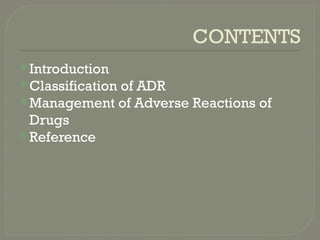Management of Adverse Drug Reaction in pharmacy practice
- 1. Management of adverse drug reaction Name-Mukesh Kapse Roll No-32 Subject-Pharmacy practice College-HTCOP chandrapur
- 2. CONTENTS ď‚žIntroduction ď‚žClassification of ADR ď‚žManagement of Adverse Reactions of Drugs ď‚žReference
- 3. ADVERSE DRUG REACTIONS ď‚ž Adverse Drug Reactions (ADRS) are the detrimental or seriously unwanted effects of drug which results at therapeutic, prophylactic or diagnostic dose level. ď‚ž ADR results to call for decreased in the dose or withdrawal of the drug from future use. ď‚ž The incidences of ADRs are due to availability of many potent drugs. ď‚ž As per WHO, adverse drug reactions are defined as any noxious and unwanted effect of drug that occurs at doses given to human being for prophylaxis, diagnosis or treatment.
- 4. CLASIFICATION OF ADVERSE DRUG REACTIONS 1) Predictable or Type 1 or Non-immunologic Reactions ď‚ž Excessive pharmacological effect. ď‚ž Side effects. ď‚ž Toxic effects. ď‚ž Secondary pharmacological effect. ď‚ž Rebound response after discontinuation 2) Unpredictable or Type B or Immunologic Reactions ď‚ž (a) Idiosyncrasy or Pharmacogenetics ď‚ž (b) Genetically Determined Toxicity ď‚ž (c) Allergic Drug Reaction (Hypersensitivity Reaction): ď‚ž (d) Super sensitivity ď‚ž (e) Photosensitivity ď‚ž (f) Intolerance
- 5. Management of Adverse Reactions of Drugs Management of ADR Evaluate the nature of event 1)Obtain history of patient 2)Classiy ADR sevierity 3)Identyfy &document the clinical reaction 4)Report ADr Established the cause Corrective and follow up action 1)Rapid action 2)Emergency withdrawal of medication 3)If dose related ADR then decrese the dose 4)Observe the patient after withdrawal of drug,if paitient suffering from withdrawal symptomps then substitute drugs should be given to that patient or giving same drug but very low concentration 5)Do not treat longer than is necessary 6) Review patient
- 6. Reference ď‚žPHARMACY PRACTICE By Dr. SACHIN V.TEMBHURNE Dr. ASHWINI R. MADGULKAR Dr.VIRENDRA S. LIGADE NIRALĂŤ PRAKASHAN page no 3.17-3.19
- 7. thankyou






